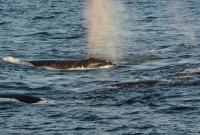Support strong Canadian climate journalism for 2025
The body of an endangered blue whale has come ashore along the western coast of Cape Breton, prompting suggestions a necropsy be carried out to determine the animal's cause of death.
The Marine Animal Response Society, a Halifax-based non-profit, says the carcass was spotted last week at Sutherland's Cove, about six kilometres north of Port Hawkesbury, N.S.
A statement from the society says it would be a "vital" research opportunity to carry out an examination on the young animal, which is slightly under 17 metres long.
However, the federal Fisheries Department hadn't confirmed by early Tuesday whether the body will be towed to a suitable location for a necropsy.
Blue whales are the largest creatures on Earth, and have a potential lifespan of 70 to 80 years.
There has been a federal recovery plan for the whales off Canada's East Coast for over 17 years, and federal scientists estimate there are no more than 250 in the population.
This report by The Canadian Press was first published Sept. 24, 2019.





Comments
It appears that this whale was so endangered that it was dead.
Maybe the editor should review the article?